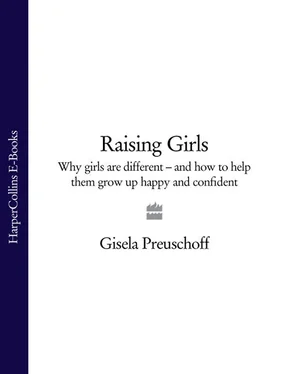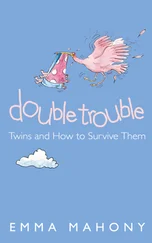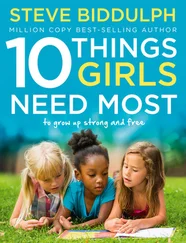Raising Girls
Why girls are different – and how to help them grow up happy and confident
Gisela Preuschoff
foreword by
Steve Biddulph

Cover
Title Page Raising Girls Why girls are different – and how to help them grow up happy and confident Gisela Preuschoff foreword by Steve Biddulph
Foreword by Steve Biddulph
Introduction
1 Why girls are different
2 Developing your relationship with your new daughter
3 Her early years
4 Her emotional world
5 How society conditions girls
6 Schools and learning
7 Becoming a young woman
8 Relationships in the family
Epilogue
Notes
Bibliography
Index
Copyright
About the Publisher
Foreword by Steve Biddulph
I remember the moment. It’s not an easy memory: I am sitting in on the Caesarean delivery of our second child, terrified for my wife’s safety, for my own powerlessness to help, and for this little life that is being prised out from the area that lies below the green surgical sheets. And then someone is saying, ‘It’s a girl!’
And amid the tears of relief are tears of joy, too, that catch me utterly by surprise. Our son is already seven years old; this new baby is long awaited. But had anyone asked me hours before, I would have given the old cliched answer – ‘I don’t care what sex it is, as long as its healthy.’
So why am I so happy? What had I been hiding from myself? A girl is something else – special to me as a man, wonderful in a different way from how a son is wonderful, and I will spend the rest of my life grappling with this, and happy to grapple, knowing it’s one of life’s gifts, a child who will become and then be a woman, and always, whatever happens, my daughter.
For a father, a daughter is something powerful. For a mother, equally so, but for quite different reasons, and we rarely feel this so intensely as in the moment they are born. And so we sit in this place halfway between feeling so lucky, so blessed, and so terrified about getting it wrong, and not being up to the job.
For help, we tap into one of the things that our culture does well – books, ideas, discussion, to help us broaden out our picture and learn from the lives of others. We don’t have elders, we don’t have a village to help us. But at least we have a questioning society that puts out so much chatter, and that brings us the thoughts from across the globe, that other people’s lives have gone into making, all for us to digest, use or discard.
This book gets beneath the surface of you and me as parents of girls, because much of the trouble we still have with girls has its roots deep in our own experience, the wounded experience of growing up in a terrible century. Most of us, men and women, had odd and difficult times growing up: distant fathers did not teach us how to father, marital chaos and widespread divorce made us distrustful and unsure of how to form strong relationships and make them work. We had little in the way of spiritual depth: the old religions collapsed but only money and pleasure rushed in to replace them. We didn’t really know the deep peace of the earth and sky around us, only the chatter of television and the clutter of bedrooms full of junk.
What we want to give our daughters, we often don’t even have ourselves. But the search is on. A baby girl in our arms, soft skin, bright eyes, sharp intelligence wanting to grow and reach out, calls to us strongly to get our act together, to focus and go looking for the tools and understanding we will need.
This book is written by a woman on her own search, and has much that stirs up your thinking. Rather than giving you formulae, lists, bullet points and glib advice (the sure sign of a third-rate parenting ‘expert’) Gisela prods your deeper searching, so that things you have kept buried inside you come to the surface – beliefs, passions, forgotten memories that can help you and direct you to be a more wide awake, fully alive human being rather than some functionary who provides meals, drives the school taxi, checks off the school bags contents for another rat race day. What our kids will remember, and what will strengthen them, is the moments of closeness, honesty, and peaceful times that we spend in amid the scramble of life: the parts that we fence off and make special, where we refuse to dance to the commercial world’s tune, and build a garden for love to grow.
Things have got better for girls. We need to remember that. There is a ‘Sooty’ video we found many years ago in a garage sale, that we enjoyed at the same time as being rather appalled when we watched it, and quietly put away on a high shelf. The compere gets children from the audience to come up on stage, asks them what they want to be. The boy will be a soccer hero. The girl will be a typist. Another boy a doctor. Another girl a nurse. This is progressive stuff – the girls actually want jobs! Twentieth-century culture crippled girls with narrow role possibilities, just as it crippled boys with inane pressure to be the brave soldier, the aloof father, the home tyrant, the frustrated wage slave.
We had a revolution, and now girls can do anything they want to, though it’s turning out to not be that simple. The empire struck back, and ugly forces of commercial greed rushed into the vacuum created by the collapse of old values, and created for girls a whole new slavery: you have to be slender. You have to have big breasts (even if it means cutting your chest open and sliding in slabs of silicone instead). You have to work your whole life long, even if you simply long for some peace and quiet with your new baby, or to be creative, or have some time to just be. You have to have it all.
We’ve made progress with girls, but as this excellent book points out, we have a long way still to go. And some quite new directions, promising and world changing, just as the changes of the sixties were world changing.
For instance, there is a lot being learned about girls:
That the apparently quiet time, the first year or so of life, is one of such rapid brain growth that everything important seems to be getting into place inside that little head and heart. The ability to love, to feel safe and relaxed, the ability to connect with another human being in empathy and trust – all happen in this first year, and we must not rush or abandon our daughter as if she were just a blob to be fed and stopped from crying.
That the world we live in is very toxic to young children -the messages the media send, and the food on the supermarket shelves – so we have to show great care in what we put into her body, and her mind.
That we parents also have plenty of cultural and psychological baggage and wounds that we can so easily pass on. I don’t want to scare you here, but simply to remind you that half of what we give our children is our own selves, and these need much rehabilitation.
What else have we learned?
That the twentieth-century idea of the father as the distant breadwinner, or the jokey stranger, has done enormous harm. We now know that fathers play an irreplaceable part in the confidence and self-esteem building of girls, a delicate role involving affection without invasion, fun with firmness, and care with strengthening levels of trust and freedom. Research into everything from anorexia to career choice, from sexual safety to educational opportunity, shows that a loving, involved dad makes a world of difference.
Читать дальше













